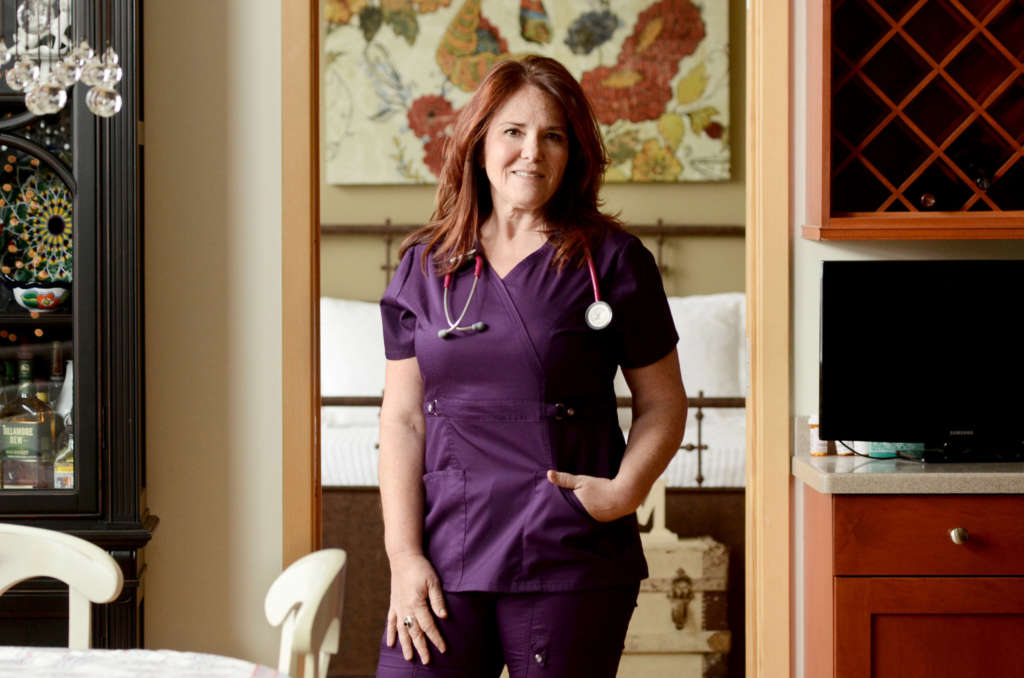After her husband, Eddy, died in 2011, Laura Callens found that her life was in limbo. Her work as a school admissions director wasn’t fulfilling. And she lived in Rochester, where companies like Eastman Kodak and Xerox have shed thousands of well-paying jobs.
But after quitting her job and spending time in Mexico, Ms. Callens had a career epiphany.
She heard about a nursing program and realized that she had honed relevant traits and skills like compassion and deep listening while caring for her husband, who had brain cancer. Though hesitant to become a student again, she applied to the nursing school at the University of Rochester, now one of the city’s biggest employers.
“My college degree was also in hospitality,” said Ms. Callens, 52. “And nursing is hospitality with sharp objects.”
Ms. Callens happily graduated last December and will soon be a neurological nurse. She will work in the Rochester hospital unit where her husband was treated.
Reinventing a career is always a nerve-racking journey. But for people who, like Ms. Callens, are in their 40s and 50s, making a change, especially in the Rust Belt, can be daunting. Assessing job opportunities, doing some smart skill-matching and getting technical training can help speed the process, experts said.
It is also worth noting that Rust Belt cities like Rochester and Cleveland are rapidly reinventing themselves as health care hubs, creating new kinds of work.
So sizing up the current job market is essential, said Jean Setzfand, senior vice president for programs at AARP. “Then look at the skill sets you’ve gained and do a matching game.”
After helping pilot a crumbling business in the Cleveland area for years, Toby Coss, 45, needed a change. He had spent 16 years working at a manufacturing company. Though he liked being a manager, declining profits meant that he was continually laying off workers, a process that was taking a psychological toll.
The low point came when he had to close a plant in Mississippi, discharging 170 employees.
“I didn’t want to do that ever again,” said Mr. Coss, a trained quality engineer. “It was disheartening.”
He knew that he didn’t want to move or return to being a quality engineer. But Mr. Coss did like running plants. Then he saw a Fastsigns franchise, which makes signs and graphics, for sale in 2014. That was a fit. “I had some familiarity with graphics,” he said, and his management experience would prove especially useful.
That is another key to successful reinvention, Ms. Setzfand said: leaning on hard-won skills.
“Start with a cleareyed analysis,” said Dorie Clark, author of “Reinventing You.” “Include what you’re good at, care about and can make money in.”
Trends can change fast and unpredictably when chasing hot careers, she added, so it is important to show that “you’re adaptable to the times.” Use every available resource — including social media like Twitter and LinkedIn — to signal your technology expertise to hiring managers.
This is not to underplay how valuable in-person connections are.
“One guy built a brand by starting a local meet-up,” she said. “If you’re that person in Gary, Ind., creating your own meet-up groups, you’ll get credit and respect.”
But digital skill gaps are creating lots of work opportunities, Ms. Setzfand said. According to IDC, a market research analyst, digital inefficiencies in the American workplace cause a 20 percent loss in worker productivity and cost the economy $1.3 trillion a year.
So free programs like TechHire, a federal initiative that helps retrain people for technology careers, are stepping into the skills gap. Big companies like Salesforce.com also offer online training though sites such as Trailhead.com.
“Even if you’re not in a smart hub,” Ms. Setzfand said, “every company has a need for technology employees.” One example, she said, is Quicken Loans in Detroit, which has a great appetite for coders and others with tech skills.
Take Philipp Blume, 44, who decided to reinvent himself as a web developer after he lost his job as a visiting professor of music at the University of Illinois in 2013. He signed up for a 19-week course at Dev Bootcamp.
“It was a great opportunity to make a career switch,” said Mr. Blume, who lives in Champaign, Ill., with his wife and son. “And music and algorithms aren’t that far apart.”
Switching to technology, he said, also gave him greater financial stability, higher pay and more job opportunities.
“When I was in music, a day’s work was never enough,” he said. “I needed to do more to stay ahead.” Now, he works 40 hours a week. “When I’m done with my workday, I can think about music again.”
Going back to school, Mr. Blume said, was the hardest part. He was older than the instructor and most students, which required some adjusting. Ms. Callens, who also took classes with younger students, had the same experience. “They all called me Mom,” she said.
Ms. Callens was challenged by learning to use technology like PowerPoint, rather than a paper notebook, and spending every spare moment on schoolwork. “There was no social life,” she said.
But she believes that she has a gift for comforting people at the end of their lives, a desired quality in her profession.
“I’m aligned now with my career,” she said. “And I feel complete. When I’m on the right path, obstacles disappear.”
(The New York Times)
